Clinical psychologist Kate Gunn is on a mission to cut farmer suicide numbers
It’s the horrendous statistic that is gripping a large part of South Australia. And Kate Gunn is on a mission to change it.
SA Weekend
Don't miss out on the headlines from SA Weekend. Followed categories will be added to My News.
Kate Gunn wanted to be a shearer’s cook.
That way she figured she’d be able to help people, not to mention be eternally popular … at least among the shearing and farming fraternity.
Gunn says she was motivated by an urge to give back from an early age.
Growing up on a mixed farm near Port Kenny (sheep, wheat and barley), which is still owned and run by her tight-knit family, she is direct, unpretentious and wears a constant smile.
“When I was young I knew that everyone loved food and everyone loved a good cook,” Gunn says.
“So I thought that the best way to help people was to be a shearer’s cook and that is genuinely what I wanted to be. And then I came away and found there were other ways to help people.”
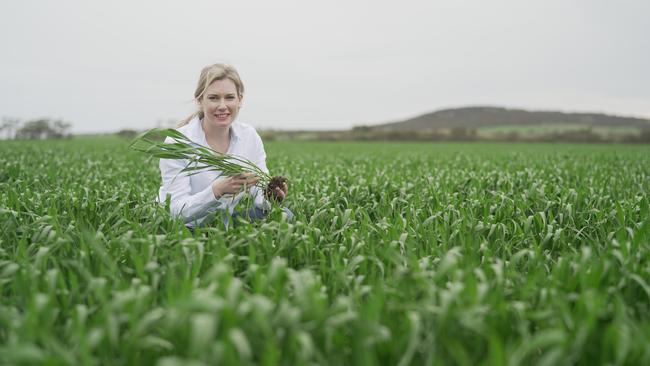
Dig a little deeper and you find there were also other, more complex motivations that consciously or subconsciously led Associate Professor Gunn to where she is today – a clinical psychologist and Uni SA researcher at the forefront of the fight to curb suicide and mental health issues in our farming communities.
But first the size of the challenge …
Gunn is fighting against figures that show farmers are twice as likely to die of suicide, compared with the rest of the Australian working population.
She’s fighting against feelings of helplessness experienced by our people on the land, who are up against everything from droughts to floods, burnout, financial pressures, climate change, and the uncertainty of what the next season, or even the next week, might bring.
She’s fighting against a culture where traditionally you just carry on, don’t share your feelings, and try to solve all your problems on your own, because that’s what your mates do, or what your dad did, and his dad before him.
And it’s a fight she’s taking national.
Gunn comes from a long line of farmers;her brother is a fifth-generation farmer at Mount Cooper; and her mother’s family were pastoralists for many generations around the Broken Hill area.
Her upbringing could not have been more happy, nor secure.
Her grandmother Gil, whom she describes as an amazing woman, studied botany at Adelaide University in the 1940s: “She always had a very scientific mind and I really love that and I guess that helped me go down the scientific path, too.”
The family farm at Mount Cooper is a 45-minute drive from Streaky Bay, and not far from Port Kenny.
Gunn went to a local primary school with about 15 other kids and scored a scholarship to boarding school in Adelaide at Seymour College, which she loved, and then decided to enrol in psychology at The University of Adelaide.
“It was a bit of a fluke, but I just really loved it,” she says.
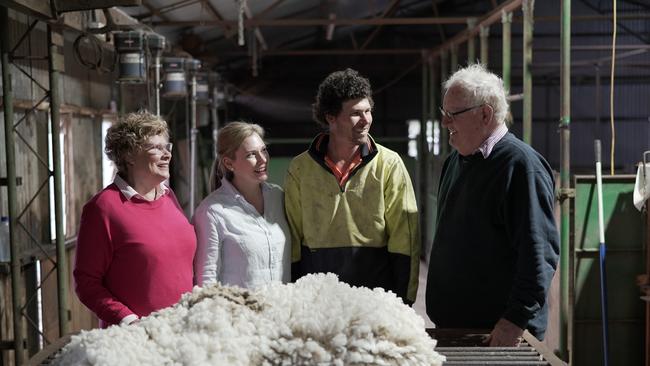
In 2008, in the shadow of a series of tough seasons on the land, she decided to do her honours research on the state of farmers’ mental health during drought.
What was the South Australian Farmers Federation at the time supported the idea, but she struggled to find academic support – every professor she approached was either too busy or didn’t think the issue was important enough – until she met Professor Deborah Turnbull.
“She said, ‘Okay, I don’t know anything about this, but you seem really keen, so I’ll give you a go,” Gunn says.
They’ve worked closely together ever since.
Gunn carried on the research and went on to do a PhD on rural cancer issues, but she was always confronted with the same problems whenever she returned to see her family and friends on the Eyre Peninsula.
“People would always say, ‘I’m worried about this person, I’m worried about that person, you’re a psychologist, what do you think I should do to help them?’,” she says.
“I was frustrated that I knew there were people with very severe mental health issues in that community, who had difficulty accessing the help they needed, let alone the people with more mild to moderate depression, anxiety or distress. And most of the mental health services at the time I didn’t really feel were culturally appropriate for farmers. Many farmers see themselves as very unique and different to the rest of the population.”
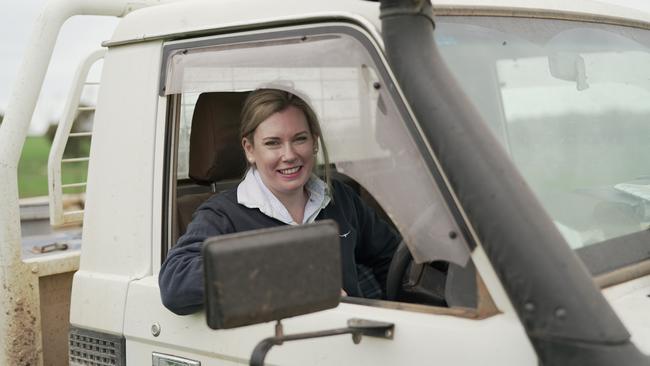
Gunn had also been touched herself. Most people you speak to on the land have at one point or another.
In her case, it was a series of confronting and tragic events; happenings that put mental health at the forefront of everyone’s mind on the Eyre Peninsula.
However, rather than turn her back on such incidents, Gunn instead sought to understand, to find answers, and make it easier for people whose mental health was deteriorating, to access appropriate help … if she could.
“I think I’ve come to the point where I don’t think that people … anyone … is fundamentally bad, despite what they do,” she says.
“I think there’s always a reason that this stuff happens.’’
So this sometimes complicated mix of experiences and messages all led to a single point: It’s time to act.
Gunn received a grant to develop ifarmwell, a website designed for farmers by farmers, which shares ways of coping with the many and varied difficulties of life on the land.
It includes modules to develop tools to cope with stress and text messages to keep users on track.
“The strength of it is that it’s really farmer focused and uses language and examples that they relate to,” she says.
And if someone is identified as being in crisis, it’s often Professor Gunn who will be on the other end of the line checking in on them.
“I love it because it connects you with the end user and people just love that someone cares,” she says.
The results have been powerful. They have found improved wellbeing, reduced distress, and those gains are maintained for a long period of time.
Almost 95 per cent of users say they would recommend it to a friend or colleague.
“The hard thing is getting farmers to actually do this and to engage with them,” Gunn says.
Despite the inroads, they were still confronted with one key question: How do we get more farmers involved?
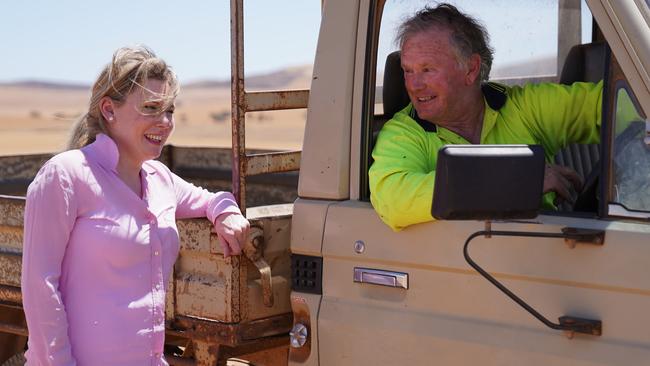
So Gunn and her growing team decided to get creative. They developed a podcast, dived into social media and began running workshops.
Even so, the cut-through was limited.
“But then about two years ago, a farmer called me up and said, ‘Hey, I’d like to write a musical about farmer’s mental health and I was wondering if you could give me some key messages that I should incorporate,” she says.
“And I said, ‘well, actually, I’ve just given a talk yesterday about the top 10 things you can do’. I could rattle them off. Anyway, he went away and I sort of forgot about it.
“A few months later, he asked if I’d mind reading the script. He sent it to me on a Saturday night and I thought, ‘Oh, here we go, another great Saturday night, here I am doing work again’. But I opened it up and it was captivating. I couldn’t stop reading it. It was like the best Saturday night entertainment ever.”
The bloke’s name was John Gladigau and, from that moment, everything changed.
John Gladigau would sit on a tractor onhis family’s farm in Alawoona, near Loxton in the Riverland, writing skits and parodies. It’s something he’s done since he was a kid.
In 1999, he wrote a Christmas play called Little Town, drew a crew of friends to pull it together, then decided to show it in Loxton. The first night 300 people turned up. The second 700. The third 1000.
He knew he was onto something. Over the next 20 years he and his closet crew put on 14 productions seen by more than 40,000 people.
In between, he branched out a little and, in 2008, organised a one-off dinner to create a fun night out for locals hurt by drought. It was called “If farmers ruled the world”.
More and more, the communities needed it, he thought at the time.
They’d been hit by drought and water restrictions and shortages and everything in between. They were struggling. This gave them the chance to get together, realise they weren’t alone, and blow off a bit of steam.
The show was all about life on the land. It combined humour, music (parody songs like “I Am Spraying”, drawn from Rod Stewart’s “I Am Sailing”), food and a message: We are in this together. People loved it, he says, and the impact was enormous.
The other shows continued around Easter and Christmas. Then Covid hit and Gladigau decided he needed to do something different.
He wanted to directly address the mental health issues afflicting his community. He knew the sensitivities and wanted to do it properly.
He didn’t want to just tick boxes and get a talking head from the city who’d just make everyone feel depressed. And, alongside every farmer he knew, he’d been impacted himself.
“I lived through 2017, 2018 and 2019, which were just three of the toughest times,” he says.
“Those three years were all in the five driest years in recorded history in the region. You just withdraw into yourself and hide away. I don’t know if I was clinically depressed in that time, but I could certainly see what it was doing to me.
“And I could see what it was doing to my fellow farmers.”
His mind also harked back to 2008 and he quickly became inspired again.
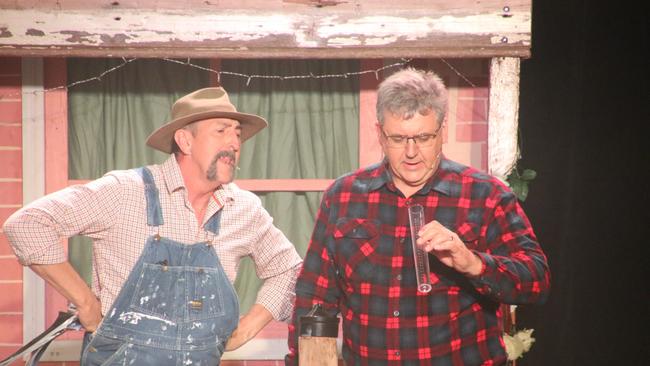
So he did what he’s always done, sat on his tractor and wrote a musical.
This one was called Kick Off Ya Boots, which tells the story of a close, multi-generational farming family, whose son falls in love with “a greenie, vegetarian journalist from the city”. Dolly Parton’s “9 to 5” was reimagined as “We Don’t Work 9 to 5”.
He wanted to get the language right around mental health issues.
Kate Gunn’s name kept popping up. So he sent it off and expected her to hate it. Well, as we know, she didn’t.
“One of the things Kate said to me on the phone in that very first conversation was ‘You know, the way to get to farmers is to do things in a way that they feel relates to them’,” Gladigau says.
“Farmers are a very different breed. There’s three ways that have been proven to be really effective. One is through food, another is music. And the third is through humour. And so we basically ticked those three boxes.”
Kick Off Ya Boots was a big hit. It sold out two years running, but it also broke down a lot of the barriers Gunn was facing: “Now I have a real farmer by my side helping with this stuff and he’s just awesome.”
At the end of each performance the audience would be asked to scan a QR code on their table and then enter something they would do differently in their life having watched the show.
A week later they’d receive a text message seeing how they were going. A few weeks later, another text.
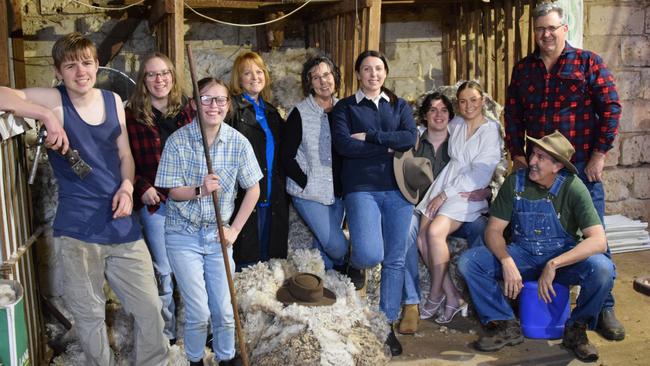
The response was overwhelming and Gunn and Gladigau were able to monitor a clear uptick in the community’s wellbeing. But this led to the next question: How do we continue these conversations to spark more widespread behavioural change?
So they applied for money from the federal Future Drought Fund and developed a social network campaign, called Vocal Locals.
They brought together a group of 10 farmers and community members from around Loxton, who did the ifarmwell modules and then they did weekly wellbeing coaching.
“And what we asked them to do is post on social media once a week about what they were doing to invest in their own wellbeing,” she says.
“Because we know that many farmers think that farm work is more important than looking after your mental health. ‘’
It won a slew of awards, including in 2022 when Gunn was awarded the prestigious Farmer of the Year Award for Agricultural Research Excellence.
“For the ag industry to realise that farmers’ mental health was worthy, that was a really exciting thing,” she says.
Gladigau adds: “Kate never makes it about herself, she’s being modest. To get this kind of recognition was nothing short of remarkable.”
In the wake of the award, Gunn sensed momentum building and headed to Canberra to meet farmer chiefs and key pollies, but with a simple message from her mate John, who was now working with her two days a week (and is now chair at Grain Producers SA), ringing in her ears: You need to think bigger.
Bigger became a $17m federal government funding application to develop a national approach to suicide prevention and wellbeing for the agriculture industry, which included an overarching steering committee, monitoring system, a campaign with ambassadors pushing out key messages over five years, a continuing cycle of research and evaluation, culminating in a farmer friendly helpline which, some may be surprised to discover, does not currently exist.
In a letter to federal Agriculture Minister Murray Watt in January this year, Gunn said action was needed now to “address the unacceptably high suicide rate among farmers and farm workers”.
It was fully endorsed by National Farmers’ Federation then-president, Fiona Simson, but they missed out.
So, now, they’re going around again for 2024.
“There’s no really co-ordinated approach and there’s no way of measuring whether anything is actually working,” Gunn says.
“So we wanted to form an advisory committee and strategy to help promote collaboration, which exists in construction, and the seafood industry, but not in agriculture.”
Gunn says the models are already there, they just need to be bigger and better funded and, from her own perspective, more widely adopted.
“We’ve done everything right in developing all these interventions for farmers, but we get the early adopters, we don’t get the masses doing them,” she says.
“We’ve managed to shift attitudes on a small scale in places like Loxton, but we can’t do it one community at a time. It’s too hard. We need big dollars and a big national, co-ordinated campaign.”
As we speak, they’re working on a new and improved strategy for the next federal budget cycle and Gunn is heading to New Zealand to examine different models, having returned from a trip to the UK.
Next up is a piece of research to ask Australian farmers how a helpline could be best designed to suit their needs.
“We need to find the best one,” she says. “And we will.”
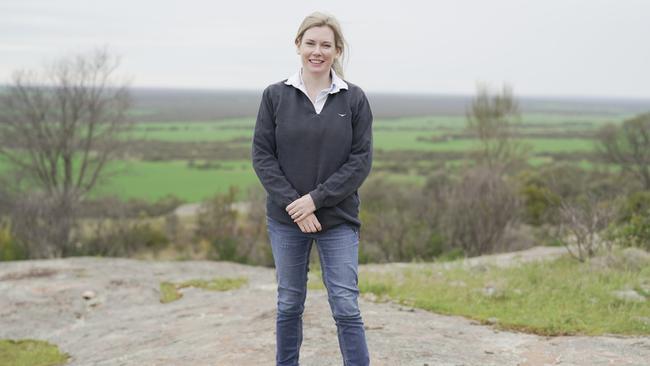
Kate Gunn loves the country. It’s clearshe wants to wrap her arms around a community and industry that has wrapped its arms around her for her entire life.
She loves that people don’t care that she’s got a title in front of her name, that they still see her as Kate, the kid from Port Kenny.
Often she has needed it every bit as much as it now needs her. She was overseas on a Churchill Fellowship in 2018 when her first marriage fell apart.
“It was really interesting that after trying so hard to help all these people at home, the only place I wanted to be was back in the country with them. They embraced me and helped me in a way that I never ever expected,” she says.
“And once everything was settled, some friends of mine said there’s someone we want you to meet. And they introduced me to Paul, who I’m now married to.
“It’s just the best thing that could have ever happened.”




